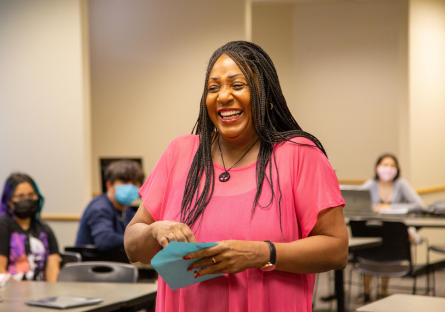

When Phoenix College (PC) Psychology faculty Dr. Debbie Webster heard MCCCD was selected to receive $6.8 million in federal funding from the Arizona Health Care Cost Containment System (AHCCCS) to address behavioral health workforce shortages, she immediately stepped up as principal investigator for PC’s $1 million portion of the award. “I took this on for PC because I thought this was a great opportunity for our students. We need people in behavioral health. We’re excited to be a part of this.”
MCCCD will engage in curriculum development to create and enhance behavioral health degree or certificate programs and incentivize participation through tuition assistance, which includes funds for student scholarships totaling $3.9 million, which will support approximately 2,210 students over two years. Dr. Webster, co-chair of the Behavioral Assessment Team (BAT) and lead faculty in the Psychology Department, noted the funding will have a significant impact on PC’s behavioral health program: “We’ve never had this type of certificate before, which will lead to job opportunities for our students. The scholarships will support our students pursuing this type of degree.”
“Building more opportunities for students to earn behavioral health degrees and credentials will create a larger and better prepared pool of candidates for critical behavioral health jobs,” said Bill Kennard, AHCCCS Workforce Development Administrator. “Better prepared candidates enable providers to streamline the onboarding process for new workers and ensure members receive care more quickly. Offering substantive, pre-service education and training for aspiring behavioral health workers is one step that will help Arizona meet its growing behavioral health care demands.”
The two-year funding will expand behavioral health programs at four other community colleges in the district: Glendale Community College, Mesa Community College, Rio Salado College, and South Mountain Community College. An additional $3.4 million is available to extend the funding to September 2025, contingent upon legislative approval and appropriation of a third year.
Scholarship funds are available for tuition assistance, books, course fees, health and safety requirements, and additional resources. Students must serve in the behavioral health field for at least two years or a period that equals the completed program length, whichever is greater, in exchange for tuition assistance.
Additionally, MCCCD will hire seven new faculty members and ten staff members across the five college campuses to support the program expansion. Each college will dedicate funds to expand and implement behavioral health programs, including equipment, supplies, and materials. Dr. Webster said PC is looking into specialized equipment, particularly a mannequin that includes software that simulates real-life scenarios with clients. “Typically used in nursing, we’re trying to see if there’s a mannequin for behavioral health,” she said.
If you are motivated to help people, serve your community, and improve the lives of those in need, consider the Behavioral Science and Human Services Field of Interest. Professionals in this field typically work with community members to identify problems and create and implement solutions. AHCCCS Scholarships are empowering the next generation of Behavioral Health Professionals.